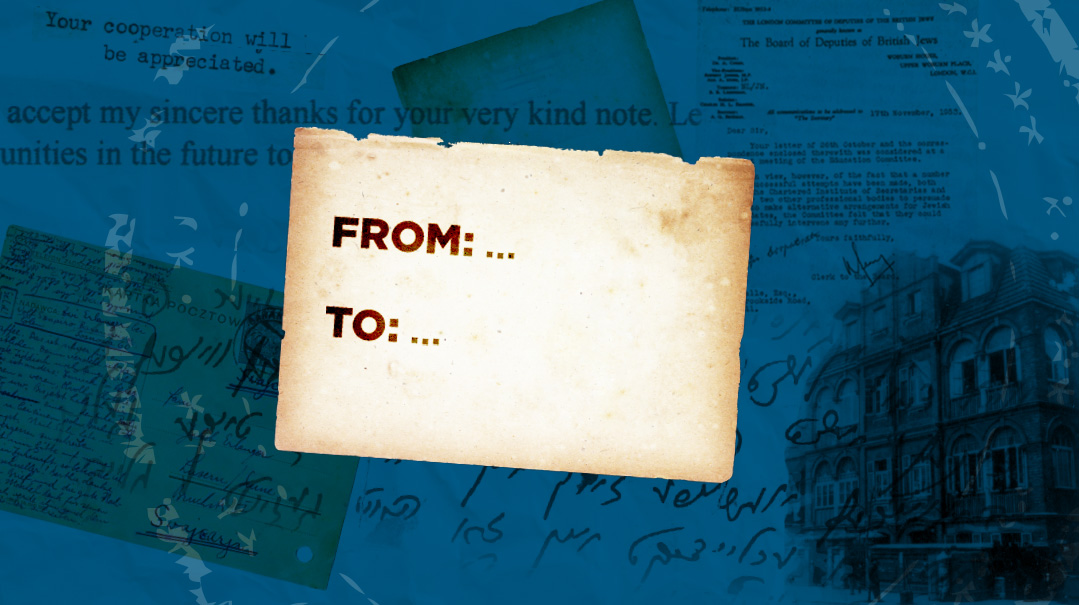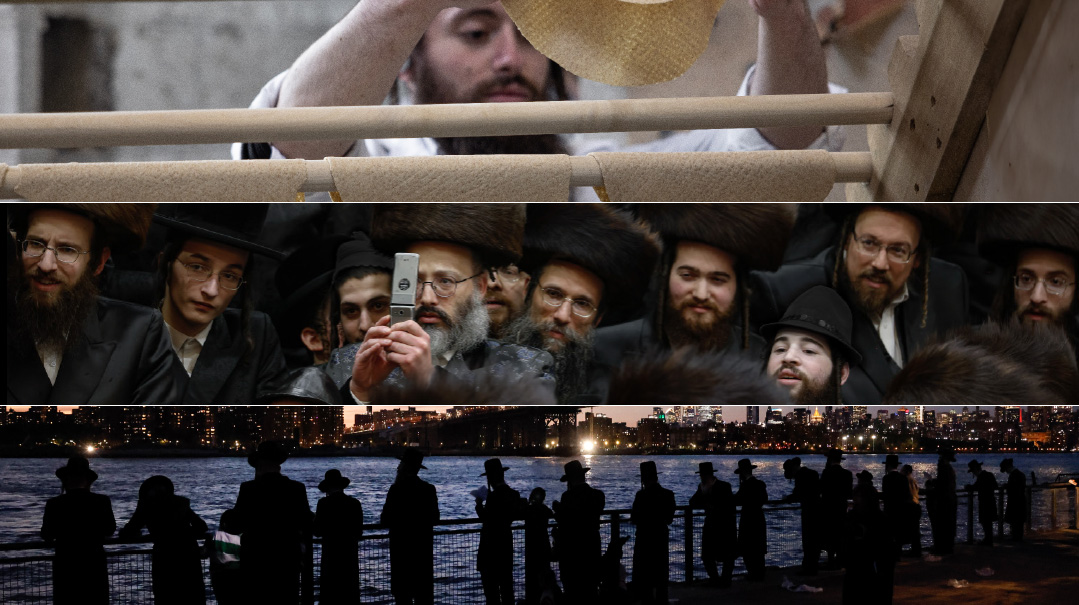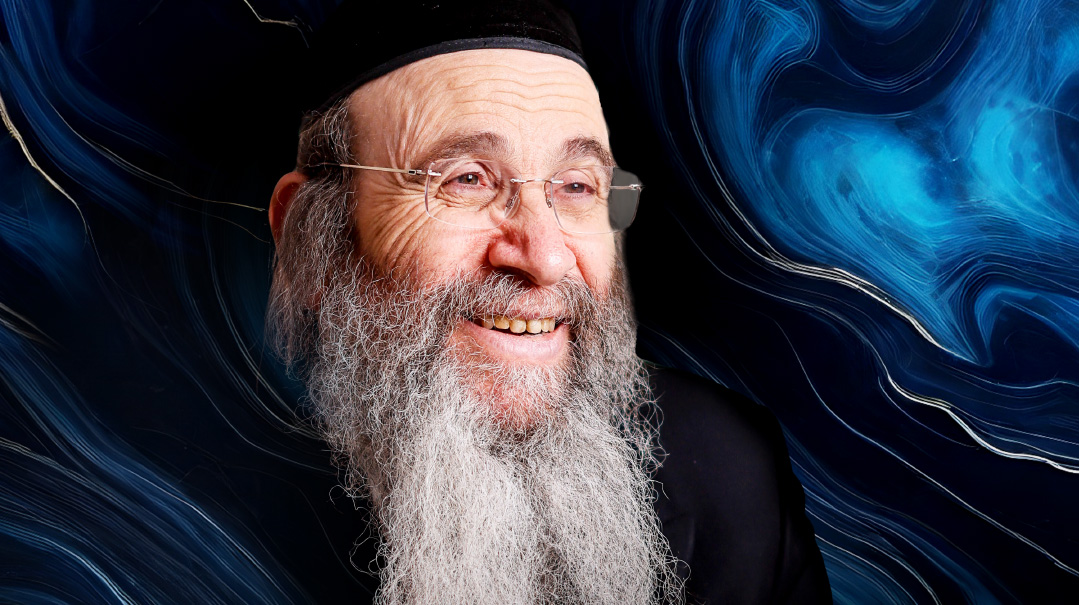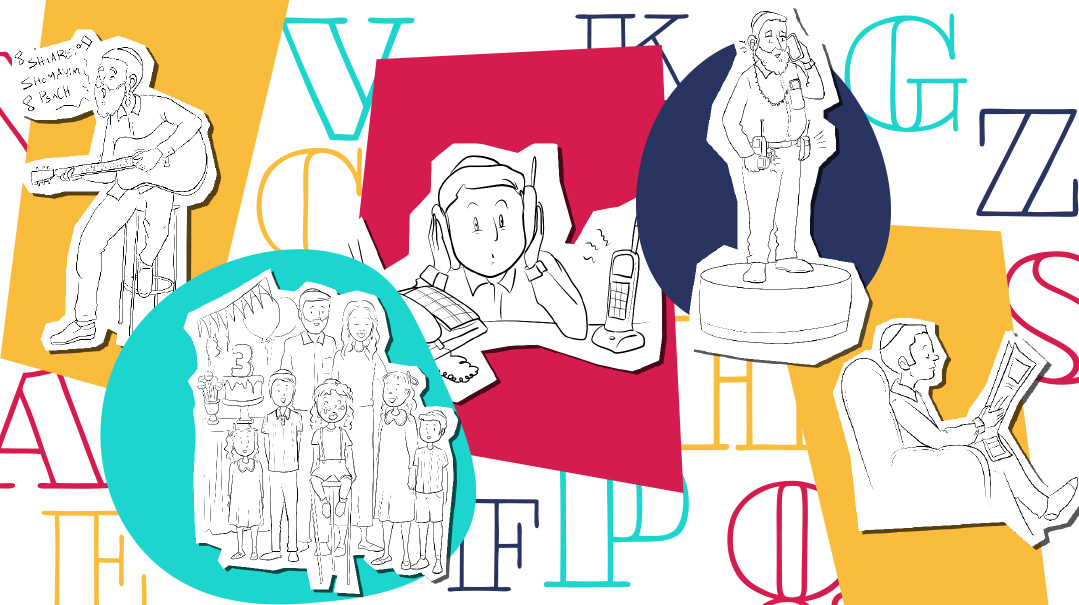Rays of Light

Despite being sight and hearing impaired, Avichai Sheli achieved his teenage dream: coveted first place in the International Bible Contest — and that’s far from his only triumph
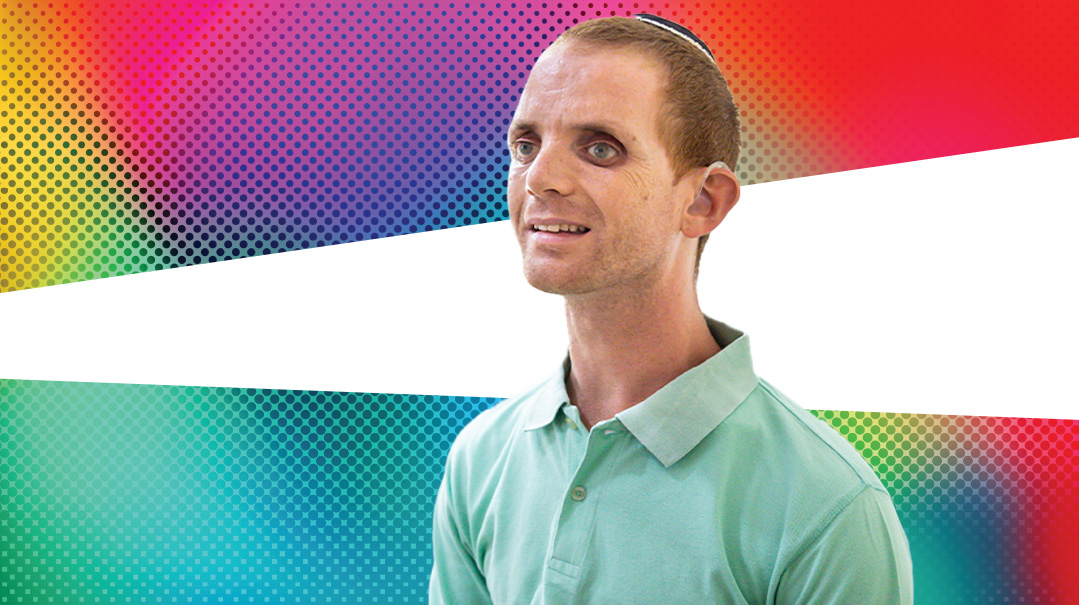
Photos: Itzik Blenitzky
Avichai Sheli will never forget the day he was called into the principal’s office as a tenth-grader in yeshivah in Kfar Maimon. “They told me my oldest sister had been killed in a car accident. I remember feeling like I was being sucked into a whirlpool of pain and grief. I asked myself, ‘What does Hashem want from me? I’m both hard of hearing and blind. How much more pain can I tolerate?’ I wanted to just fall apart. Somehow, I continued learning and davening, going through the motions, but I was in a spiritual crisis and my heart wasn’t in it.”
Avichai takes a breath, and I take a good look at this candid and courageous man. His eyes are fixed on some indiscriminate point in the distance as he continues: “It took a few years until I began to understand and internalize that HaKadosh Baruch Hu has His own calculations. I began to come to terms with the fact that not only do I not understand everything, but I pretty much understand nothing.”
In conversation with Avichai, it certainly doesn’t seem like he’s been shaken by a crisis of faith. He peppers his speech with long, often obscure quotes from Tanach, and it’s no wonder. Despite being sight and hearing impaired since early childhood, he achieved the unbelievable as a teenager: coveted first place in the International Bible Contest. And that’s far from his only triumph. He went on to serve in IDF military intelligence, earned both business and law degrees, works today as an investment advisor, is married with a family, and is a motivational speaker who continues to inspire others facing seemingly insurmountable challenges.
“Nothing was easy,” he admits. “But I discovered that sometimes, from this low place, within the stumbling and the difficulty, it’s possible to grow and reach heights that we never could have from a state of comfort. ‘Veholachti ivrim baderech lo yadau b’nesivos lo yadu adricheim [And I will lead the blind on a road they did not know; in paths they did not now I will lead them. I will make darkness into light before them],’” he quotes Yeshayahu from memory. “I know that Hashem has been with me along the whole route.”
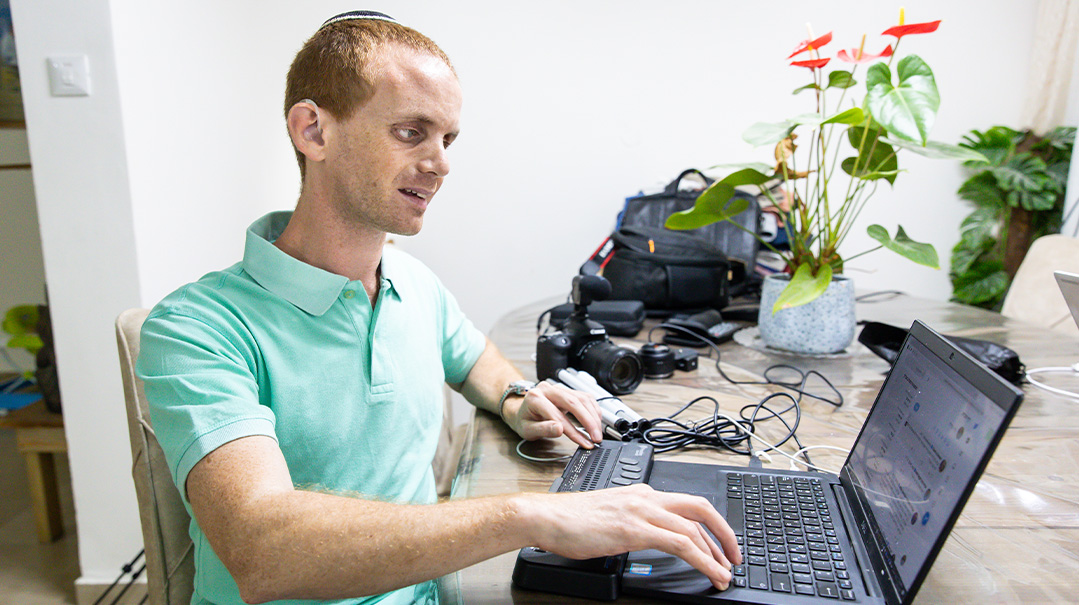
Between his two hearing aids, a state-of-the-art computer for the visually impaired, and his trusty walking stick, Avichai Sheli never feels a part of the world is cut off from him
Avichai was born as a healthy baby 39 years ago this month in the southern Israeli town of Netivot. When he was two, he contracted a critical case of meningitis and lost his hearing in a lifesaving medical procedure. Due to his impairment, he didn’t speak, and his family assumed he was both deaf and mute. But a specialized hearing exam at age four indicated that he hadn’t totally lost his hearing, and so, fitted with hearing aids and lots of hard work by his parents, he learned to speak. Yet right around then, something else happened: little Avichai fell in the playground and glass got into his eyes, which caused irreversible damage to his vision. Over the next few years, a series of additional medical issues led to a near total deterioration of his vision.
“It wasn’t easy to raise a blind child,” he says, “but my parents fought like lions to keep me in a regular school and not put me into a special education institution. Back then, its wasn’t so accepted to integrate children with disabilities in regular schools, and for my parents it meant they needed an iron will, because the teachers weren’t always cooperative.
“I remember one year, the homeroom teacher was asked to choose the highest achievers for an after-school program for gifted students, and although my grades were among the highest in the class, the teacher didn’t choose me. When my parents discovered this, they confronted the teacher, who explained that because I was blind, he was afraid I’d struggle with both integrating and even getting to the place. I remember how much pain this caused them.”
At the time, mainstreaming and integration were pretty foreign concepts, and many parents objected to having a blind child in their son’s class. “The parents’ attitudes rubbed off on their children, and they would hit me, harass me and laugh at me,” Avichai says. “It was painful and humiliating.”
But even for the teachers who rallied behind him, for many of them, it was more out of pity than giving this extremely bright child a chance to live up to his challenges. “They tried to make things easier for me,” he remembers, “but I didn’t like that either. I didn’t want to be the object of anyone’s pity.”
Avichai was able to participate in class by using Braille, getting textbooks from a library for the blind, and by enlisting the help of a rehab aide who printed out class worksheets and tests in Braille, and then translated the answers back into Hebrew letters. (By the time he was in yeshivah high school, when computer programs for the visually impaired were introduced, it was a gamechanger for him.)
Recess wasn’t as physically challenging as it was emotionally wrenching: He learned to navigate the school grounds, but there was usually no one to play with. And so, Avichai usually stayed in the classroom, reading books in Braille; sometimes he’d wander through the corridors himself.
Yet despite the struggles of those early years, Avichai says he’s forever indebted to his parents for not giving up or giving in.
“Had I learned in a special school it might have been easier for me until a certain age, but how would I have managed once I hit the real world? How would I have coped? The fact that my parents got me accustomed from early on to interact with people and navigate mainstream society made me into an independent person.”
W
hile Avichai was the victim of bullying and harassment through elementary school, once he entered the Beit Yehudah yeshivah high school in Kfar Maimon, there was an instant transformation. “It was a yeshivah with a dormitory, and suddenly I had friends who welcomed and accepted me. I managed myself more or less without a special teacher, and when I needed help, there was always someone willing at my side.”
He’d even go on school trips and hikes, and when the guides would suggest “leaving the blind guy on the bus,” his friends made it clear: “If he doesn’t go, we don’t either.”
“The staff at the yeshivah was wonderful,” Avichai relates. “The rebbeim were always thinking of creative ways to help me, making sure I had all the seforim I needed in Braille, organizing chavrutot and the like — and most importantly, treating me like a normal teenager.”
From the time he was a little boy, Avichai had a dream — or perhaps a fantasy — of participating in the Chidon HaTanach, the International Bible Contest, the final round of which is broadcast nationally in front of a live audience of thousands every year on Israel Independence Day. When he was four years old, a neighbor from Netivot was the winner, and that hometown celebrity teen became his hero.
“Actually, the main impetus was my mother. She was dedicated to developing my speech skills and would constantly be telling me stories, and mostly stories from Tanach — and that ignited my love and connection to Tanach. I always dreamed about taking part in the Chidon, and I believed, maybe naively, that I had a shot. It was all a matter of review, and lots of hard work — studying every night. Committing every pasuk to memory. I competed four times from ninth grade until I was 18, but the first three times I didn’t make it into the finals. The fourth time, my dream came true.
“Technically, there was no big difference between me and the other contestants. To prepare, we all learned from the same Tanach, just that I used my Braille edition. At the contest itself, the questions were directed to me at the same pace, but a contest representative typed out the answers that I wrote in Braille and gave them to the judges in regular print. Then I read my answers out with a microphone.”
It was 20 years ago, but Avichai is still overwhelmed when he thinks about those moments when the famous voice of longtime Bible Contest emcee Avshalom Kor announced, “And in first place — Avichai Sheli, a talmid at Yeshivat Beit Yehudah, Kfar Maimon!”
“Every time I talk about my triumph, about beating the odds, I experience that feeling all over again, even though two decades have passed,” he says. “And it makes me realize that if someone like me can, b’ezrat Hashem, get to the point where I am, then anyone who does have seeing eyes and hearing ears and all the tools he needs, surely must not give up because he can certainly succeed.”
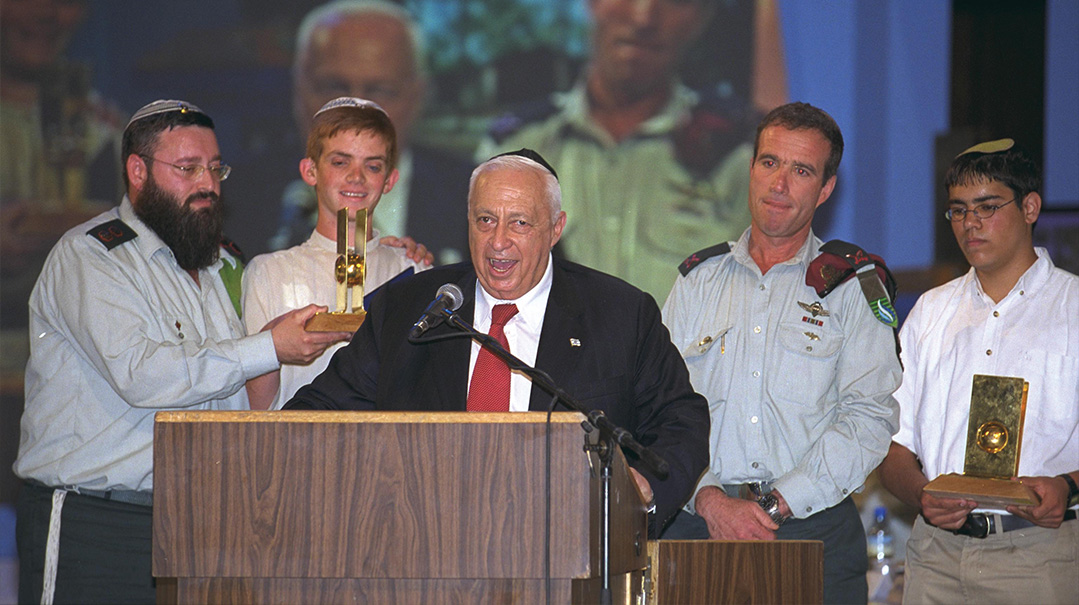
Prime Minister Arik Sharon congratulates an overwhelmed yet confident Avichai as winner of the Chidon HaTanach in 2002. After that, Avichai knew he could do anything he set his mind to
While the Bible Contest proved to Avicahi that his dreams were within reach, each additional step was its own struggle. His disability could have exempted him from IDF service, but Avichai didn’t want any favors. He couldn’t be on the battlefield, but he was smart and had a phenomenally-honed memory. He would try for the Intelligence Corps, the famed Unit 8200.
“At first it looked pretty hopeless, because how can an intelligence corps that calls itself the ‘eyes and ears’ of the country accept someone who has the use of neither? But at that point, I found within me the confidence to insist they at least test me and try me out, and with siyata d’Shmaya, I succeeded.”
Three years later, Avichai embarked on a professional career. “At first, I considered working in the stock market, and to do that, I got a bachelor’s degree in business. I knew I’d be the first blind person trying to break into the field, but in the end, I realized that it wasn’t as complex as all the naysayers said it was.”
Avichai went on for a master’s degree in law and began to work as an investment manager at the Psagot Investment House in Tel Aviv, around the corner from the stock exchange. He was the first blind person in Israel to have such a position. The computer, he says, has been his lifeline.
Later, Avichai began working as a corporate financial advisor for Deloitte, an international accounting company. “It’s a very diverse company on the human resources level,” he says, “with a lot of employees who are shomrei mitzvot.”
While both Psagot and Deloitte accepted him on his merits, “I endured a long, complicated path until I was hired by places that put so much faith in me. Corporate hiring of people with disabilities is definitely an area that could use improvement, and unfortunately, I often encounter cases where people with limitations find themselves outside the field completely.
“It’s true that during the last decade there’s been a lot of progress and much more awareness. Businesses today are more open to employing people with limitations, and there are also laws that demand this, yet the percentage of employees with disabilities is still very low.
“But part of that, I must say, is that many people with disabilities don’t believe enough in themselves. For example, a young man with a disability reached out to me — he’s a wonderful, clever person and he asked me to help him find work. I was happy to help and we found him a good position. At first it was very challenging for him, but then he stepped up to the plate, and I understood from his manager that he was keeping up with the pace and succeeding. But then he shocked both of us — he just broke down and said that he was quitting.
“It turned out that there were a number of employees who made insensitive comments, and he was so offended that he decided not to come back. For me, that reinforced the idea that yes, we need to work with employers and the government to give incentives and chances, but it’s just as important to work with the people with the disabilities. They won’t manage if they continue to see themselves as miskeinim. They need to find the inner courage to become part of mainstream society.”
W
hen Avichai was 31, the greatest dream of all came true — he stood under the chuppah with his new wife, Tzila.
“I always believed that my shidduch would come,” he says. “I know so many people, and it was clear to me that one of them would connect me to my bashert. But even so, I still had a fear — how would such a marriage look and how would we raise children?
“Today I can tell you that my fears were unfounded. The person who made the shidduch was my wife’s friend. She’d attended one of my speeches and thought it could work. My wife is a lawyer, and is not vision-impaired. Today, baruch Hashem, we live in Netivot, near my family, and are parents to two children — Shachar Meir, four, and Ronnie Rachel, who is a year old. While I never gave up on my dream, sometimes I still have to pinch myself when I think about this beautiful family.”
When I gently ask him whether Tzila, too, has some disability, he shares, “Yes, she has a genetic disorder in which her arms are much shorter than normal. You know, it would really upset me when shadchanim would call me and tell me, ‘I have a great girl for you, and she’s also blind.’ I would tell them, ‘Not only are you not solving my problem, you’re making it worse. How do you expect two blind people to function? At least there should be some kind of balance, that we can complement each other.’”
Does Avichai feel his role as father is compromised due to his disabilities?
“I’m a pretty hands-on father,” he says. “I take my children to the park, I slide with them and swing with them, play with them and even cook them meals. My mother insisted that I learn to cook and do household chores from the time I was a kid, and today my wife and I divide things up. Usually, I cut and season and prepare the meal for cooking, and she puts the food on the flame, flips, fries and deals with the oven, because those are the dangerous parts for me.
“And I also learn Tanach with my children — it’s never too late to start. Each night before going to sleep, I tell them stories of Tanach. I’m up to Sefer Bamidbar with my daughter, and I’ve already reached Sefer Ezra with my son.
“And yes, little as they are, they both understand that I can’t see. It’s just a regular part of life for them. My son loves to build with Lego and he takes my hand and says, ‘Abba, come touch the surprise I built you.’ Then he places my hand on it so that I can feel it. My daughter doesn’t talk yet, but when she wants something, she puts my hand on the object she’s asking for.”
IN Netivot, and all over Israel, there are good, kind people who jump to help Avichai when they see him navigating the street with his trusty stick. Those who recognize Avichai know that he’s fiercely independent, but today, he says, he realizes that there’s nothing shameful about accepting help from others.
“The truth is that it took me time to learn this, but today I understand that each person contributes to the world in a different way. Sometimes I’m a giver and sometimes the receiver of another’s giving.
“Still, I try my best to manage on my own. I have my little tricks that help me, like using my Braille watch to calculate the distance between stops on the train and therefore knowing when to get off, and today in general, there are highly-developed accessibility systems on buses and trains, loudspeakers and all kinds of signals that help the vision and hearing impaired. But even in the past, when these sophisticated systems weren’t in place, it never happened that I got stuck even for a minute without someone coming over to ask if I needed help. Baruch Hashem, everyone wants to help.
“Just recently,” he continues, “I left my office and was walking down the street with my stick, when a very kind person approached, gripped my arm and offered to escort me. He had his young son with him, who said, ‘But Abba, my teacher told us that before you want to help, you first have to ask the person if he wants help.’ The man was taken aback, quickly took his hand off my arm, and said to his son, ‘You’re right, and it’s not okay that I didn’t ask first.’ Then he turned to me and apologized. I smiled at them both and said it was alright, that I appreciated the help. I really did — and I was very moved by the teacher who showed sensitivity to the handicapped, to the child who sensed a complicated situation, and to the father who willingly accepted his son’s innocent comment.”
Of course, there are challenges, but Avichai prefers not to focus on them — although he admits he’s still shaken by a shooting attack four years ago, when he was on a bus from Jerusalem to the Shomron. He was sitting in the front, by the window, when terrorists opened fire on the bus. The bullets whizzed by him and it took a few seconds for him to realize what was happening.
“When I realized it was an attack, I threw myself onto the floor. Glass shattered every which way and I felt the blood oozing from my arm. I was terrified that the attackers were closing in on the bus, and the fact that I couldn’t see just intensified the fear. Finally, I felt strong hands holding me and lifting me. The guy holding me said, ‘I’m a security officer and you’re safe now.’ He accompanied me to the ambulance and even stayed for the ride.”
The fact that Avichai could hear naturally and see in the past, when he was very young, is both a challenge and a blessing. He knows what a bus — and what an ambulance — looks like. Does that make life easier?
“It’s a question I’ve thought about a lot,” he reflects. “I remember in math class when we were learning spatial concepts in solid geometry, the teacher told me he believed I could comprehend the material because I remember how the world looks, even though today I don’t see, and that I have a spatial grasp based on the past. I believe this is true, because although the world around me is black, I imagine how things look and think about them often.
“At the same time, specifically because I saw in the past, I have a much stronger yearning to be able to see than someone blind from birth. I want to see my wife. I want to see my children. When I speak to my mother, I think of what she looked like 35 years ago, but even that is already a hazy memory. But in the end, I keep my focus on the pasuk from Yeshayahu 9, ‘Ha’am haholchim bachoshech, ra’u ohr gadol [The people who walked in darkness, have seen a great light].’ I believe that at the end of every tunnel awaits light, and only light.”
(Originally featured in Mishpacha, Issue 926)
Oops! We could not locate your form.



